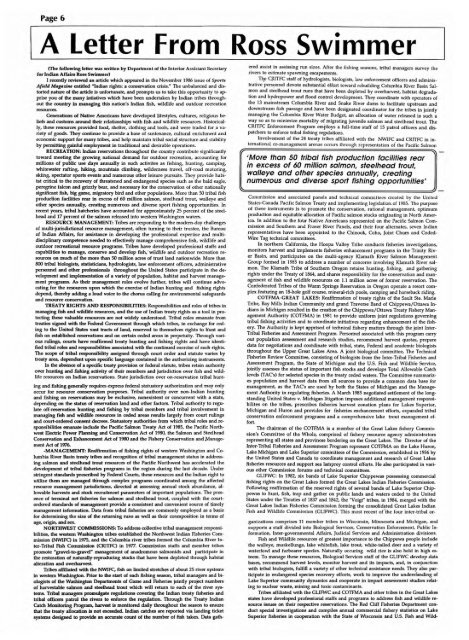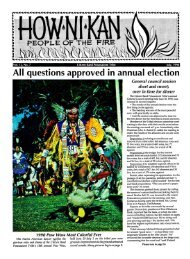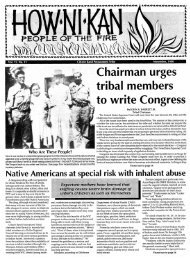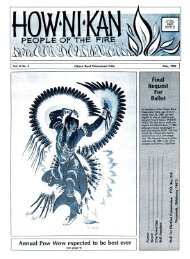Tax Commission declares war - Citizen Potawatomi Nation
Tax Commission declares war - Citizen Potawatomi Nation
Tax Commission declares war - Citizen Potawatomi Nation
You also want an ePaper? Increase the reach of your titles
YUMPU automatically turns print PDFs into web optimized ePapers that Google loves.
Page 6<br />
I A Letter From Ross Swimmer<br />
(I'h.~ following letter was written by Department of the Interior Assistant Secretary<br />
for Indian Affair's Ross Swimmer)<br />
I recently reviewed an article which appeared in the November 1986 issue of Sports<br />
Afield Magll%i~entitled "'Indian rights: a conservation crisis." The unbalanced and distorted<br />
nature of the artide is unfortunate, and prompts us to take this opportunity to apprise<br />
you of the many intiatives which have been undertaken by Indian tribes throughout<br />
the country in managing this nation's Indian fish. wildJife and outdoor recreation<br />
resources.<br />
Generations of Native Americans have developed Ufestyles, ruJ tures, religious beliefs<br />
and customs arDWid their relationships with fish and wildlife resources. Historically,<br />
these resources provided food, shelter, clothing and tools. and were traded for.3 variety<br />
of goods. They continue to provide a base of sustenance, cultural enrichment and<br />
economic support for many tribes, and help maintain tribal social structure_and stability<br />
by permitting gainful employment in traditional and. desirable operations~<br />
RECKEATION: Indian reservations throughout the country contribute significantly<br />
to<strong>war</strong>d meeting the growing national demand for outdoor recreation. accounting for<br />
millions of public use days annually in such activitcs as fishing. hunting. camping.<br />
whitewater rafting. hiking. mouhtain climbing. wilderness travel. off-road motoring.<br />
skiing.. spectator sports events and numerous other leisure pursuits. They provide habitat<br />
critical to the recovery of threatened and endangered species such as the bald eagle.<br />
peregrine falcon and. grizzly};lear. and necessary for the conservation of other nationally<br />
Significant fish. big game. migratory bird and other populations. More than 50 tribal fish<br />
production fadlilies rear in excess of 60 million salmon, steelhead trout, waUeye and<br />
other species annually. creating numerous and diverse sport fishing opportunities. In<br />
recent years, tribal hatcheries have accounted for approximately 25 percent of the steelhead<br />
and 17 percent of the salmon released into western Washington waters.<br />
RESOURCE MANAGEMENT: Tn"bes are responding to the modem-day challenges<br />
of multi-jwisdictional resource management. often turning to their trustee. the Bureau<br />
of Indian Affairs, for assistance in developing the professional expertise and multidisciplinary<br />
competence needed to effectively manage comprehensive fish, wildlife and<br />
outdoor recreational resource programs. Tribes have developed professional staffs and<br />
capabilities to manage, conserve and develop flSh, .wildlife and outdoor recreation resources<br />
0Jt much of the mme than 50 million acres of trust land nationwide. More than<br />
800 bibal biologists, statisticians,. hydrologists, law enforcement officers, administrative<br />
personnel and other professionals throughout the United States participate in the development<br />
and implementation of a variety of population. habitat and harvest management<br />
programs. As their management roles evolve further. tribes will continue advocating<br />
for the resources upon which the exercise of Indian liunting and fishing rights<br />
depend. thereby adding a loud voice to the chorus calling for environmental safeguards<br />
and rcsomce conservation.<br />
TREATY R.ICHTS AND RESPONSmILITIES: Responsibilities and roles of tribes in<br />
managing fish and wildlife resources, and the use of Indian treaty rights as a tool in protecting<br />
these valuable resources·are not widely understood. Tribal roles emanate from<br />
treaties signed with the Federal Government through which tribes. in exchange for ceding<br />
to the United States vast tracts of lan&:L reserved to themselves rights to h"unt and<br />
fish on established reservations and on certain ceded areas in perpetuity. TIuough various<br />
rulings. courts have·reaffirmed treaty hunting and fishing rights and have identified<br />
bibal roles and responsibilities associated with the continued exercise of such rights.<br />
The scope of tribal responsi,1nIity assigned through court order and statute varies by<br />
treaty~ dependent upon specific language contained in the authorizing instruments.<br />
In the absence of a specific treaty provision or federal statute, bibes retain authority<br />
over hunting and fishing activity of their members and jurisdiction over fish and wildlife<br />
resources on Indian reservations. Slale jurisdiction over on·reservation tribal hunting<br />
and fishing generally requires express federal statuatory authorization and may only<br />
occur for resource conservation purposes. Tribal authority over non-Indian hunting<br />
and fishing on reservations may be exclusive, nonexistent or concurrent with a state.<br />
depending on the status of reservation land and other factors. Tribal authority to regulate<br />
off-reservation hunling and fishing by tribal members and tribal involvement in<br />
managing fish and wildlife resources in ceded areas results largely from court rulings<br />
and court-ordered. consent deaees. Slatuatory authorities from which tribal roles and.responsibilities<br />
emanate include the Pacific Salmon Treaty Act of 1985, the Pacific Northwest<br />
Elecbic Power Planning and Conservation Act of 1980, the Salmon and Steelhead<br />
Conservation and Enhancement Act of 1980 and the Fishery Conservation and Management<br />
Act of 1976.<br />
·MANACEMENT: Reaffirmation of fishing rights of western Washington and Columbia<br />
River Basin treaty tribes and recognition of tribal management status in addressing<br />
salmon and steelhead trout resources of the Pacific Northwest has accelerated the<br />
development of tribal fisheries programs in the region .during the last decade. Under<br />
stringent standards prescribed by Federal Courts, these resources and the Indian right to<br />
utilize them are managed thi'ough complex programs coordinated among the affected<br />
resource management jurisdictions, directed. at assessing annual stock abundance, allowable<br />
harvests and stock recruitment parameters of important populations. The presence<br />
of terminal net fISheries for salmon and steelhcad trout. coupled wilh the court~<br />
ordered. standards of management provide a consistent and convenient source of timely<br />
management information. Data from tribal fisheries are commonly employed as a basis<br />
for determining the size of the returning runs as well as their conmposition in terms of<br />
age. origin. and sex.<br />
NORTHWEST COMMISSIONS: To address collective tribal management responsibilities.<br />
the western Washington bibes established the Northwest Indian Fisheries Com·<br />
mission

















